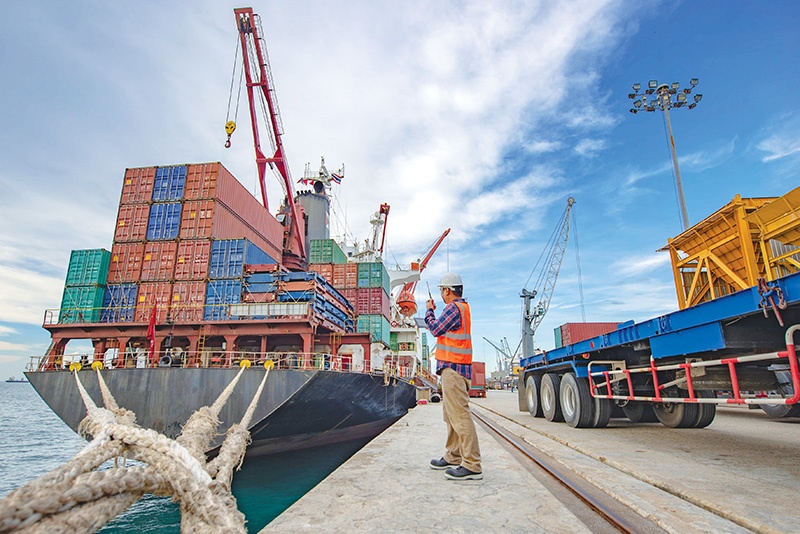Potential drivers set for both greener trade and growth
 |
| The government set a target of $61.37 billion in state budget revenue and $77.6 billion in spending for 2022, Photo: Shutterstock |
Carolyn Turk, country director for Vietnam of the World Bank, last week said that given the importance of trade in Vietnam’s economic growth, “greening the trade sector should be the priority to ensure sustainable and strong growth going forward. It will also help the country keep its pledge to reach net-zero emissions by 2050.”
The government has established a national steering committee on implementing the commitment made at COP26. At the first two meetings of the committee, the government ordered ministries to formulate specific action plans to cut down on GHG emissions, especially in the industries with big emissions such as coal-fired power, steel, cement, textiles and garments, electronics, and agriculture.
“The trade sector has been an important driver of Vietnam’s remarkable economic growth over the past two decades but also produces one-third of the country’s total GHG emissions – and is polluting. This includes agriculture, manufacturing, and transport services,” Turk said.
While Vietnam has started to decarbonise activity associated with trade, more needs to be done to respond to mounting pressures from main destination markets, customers, and multinational companies for greener products and services.
“Trade will be a key component of Vietnam’s climate actions in the years to come,” Turk reaffirmed. “Promoting greener trade will not only help Vietnam follow through on its pledges but will also help it keep its competitive edge in international markets and ensure trade remains a critical income and job generator.”
Thanks to its increased international economic integration with various free trade agreements, Vietnam’s trade with the world increased annually. Last year, the export-import turnover hit $668.5 billion, up 22.6 per cent on-year and nearly doubling the country’s GDP of an estimated $336.25 billion. In which the export and import values totalled $336.25 billion and $332.25 billion, up 19 and 26.5 per cent on-year, respectively. The total trade surplus stood at $4 billion.
However, according to the World Bank’s Taking Stock report released last week on Vietnam’s economy, the country’s export competitiveness could be affected by the mitigation policies of its major trading partners. Consumers in Vietnam’s major export markets such as the US or the EU are increasingly demanding more environmentally-friendly goods and cleaner production processes.
Also, many foreign-invested enterprises are part of value chains where the central corporations have committed to greener practices as part of their corporate social and environmental commitments.
“Such commitments will trickle back to producers along the value chains. For example, Apple is transitioning its entire supply chain to 100 per cent clean energy. Foxconn, one of Apple’s major suppliers, which has recently moved assembly lines to Vietnam, will be subject to Apple’s environmental-social-governance and decarbonisation requirements,” said the report.
Many countries are contemplating setting higher tariffs on polluting goods and services to reduce emissions by raising the price of carbon. Such decarbonisation policies can impact global markets and cause shifts in technology, fuel availability, and trade dynamics from changing consumer preferences or tariffs on emission-intensive goods. Two key determinants of the level of potential exposure to transition risks are the level of exposure to international markets, and the emission intensity of its trade-exposed sectors relative to the emission intensity in other countries.
“For example, the EU is one of Vietnam’s main export destinations. An analysis of Vietnam’s relative emission intensity and trade exposure of key products to the EU finds that Vietnam’s exposure is in inorganic chemicals and machinery, given the high export share of these products,” said the report.
Jacques Morisset, World Bank lead economist and programme leader for Vietnam, noted that greening trade can help reduce the carbon or environmental footprint of trade industries. In turn, these reductions contribute to implementation of a green, resilient, and inclusive development approach and help Vietnam reach its national mitigation objectives.
“Secondly, greening trade can spur existing industries to retool to green technology and remain competitive in the future low-carbon world. Thirdly, it can offer new opportunities for trading in environmental goods and services.
Finally, greening trade is expected to be a potential driver of new jobs as existing industries retool and businesses take advantage of opportunities in new environmental goods and services,” Morisset said.
Vietnam’s economic recovery is likely to accelerate in 2022 as GDP growth is expected to rise to 5.5 from 2.6 per cent in the year just ended, said the World Bank’s Taking Stock.
Standard Chartered Bank last week also released its fresh forecast that Vietnam’s recovery will accelerate markedly in 2022, with GDP growing by 6.7 per cent. The bank raises its 2023 growth forecast for Vietnam to 7 per cent as it believes Vietnam’s positive medium-term outlook remains intact.
What the stars mean:
★ Poor ★ ★ Promising ★★★ Good ★★★★ Very good ★★★★★ Exceptional
Related Contents
Latest News
More News
- NAB Innovation Centre underscores Vietnam’s appeal for tech investment (January 30, 2026 | 11:16)
- Vietnam moves towards market-based fuel management with E10 rollout (January 30, 2026 | 11:10)
- Vietnam startup funding enters a period of capital reset (January 30, 2026 | 11:06)
- Vietnam strengthens public debt management with World Bank and IMF (January 30, 2026 | 11:00)
- PM inspects APEC 2027 project progress in An Giang province (January 29, 2026 | 09:00)
- Vietnam among the world’s top 15 trading nations (January 28, 2026 | 17:12)
- Vietnam accelerates preparations for arbitration centre linked to new financial hub (January 28, 2026 | 17:09)
- Vietnam's IPO market on recovery trajectory (January 28, 2026 | 17:04)
- Digital economy takes centre stage in Vietnam’s new growth model (January 28, 2026 | 11:43)
- EU Council president to visit Vietnam amid partnership upgrade (January 28, 2026 | 11:00)

 Tag:
Tag:


















 Mobile Version
Mobile Version